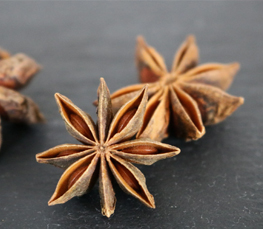Its time to dig out all those messy bags of herbs and spices that you never use! Or start buying herbs and spices you see in the supermarket…but didn’t buy before because you did not know how to use them. Medicinal kitchen herbs are also a cheaper way to get herbal medicine and natural healing into your life EVERYDAY and while your cooking will taste more interesting.
Herbs and spices used in cooking traditionally were always included to help the easy digestion of heavy foods, break down rich or fatty foods and help destroy parasites and other bacteria that may be present in the food. Remember; herbs and spices have been around a lot longer than refrigeration!
A pestle and mortar (see above) is helpful for grinding these herbs or use a coffee grinder.
N.B ‘Astringent’ = a substance that contracts the tissue or canals of the body, thereby diminishing mucus/blood or cleans the skin and constricts the pores.
Here are some of the most common.
Aniseed (Pimpinella anisum):

A sweet spice. It is excellent for breaking up mucus in the body and for the relief of cramping in the bowels, as well as colic and flatulence. It is also very calming and soothing for the nervous system and helpful for alleviating sleeplessness.
Caraway (Carum carvi):

Is an excellent aid to digestion and relieves indigestion.
Cardamom (Elettaria cardamomum):

It warms the body and soothes digestion. You need to break into the pod for the flavour and medicinal qualities.
Cayenne Pepper (Capsicum annuum):

It is a medicinal and nutritional herb. It is the purest and best stimulant. It is an excellent food for the circulatory system, as it feeds the necessary elements into the cell structure of arteries, veins and capillaries so that they regain elasticity. It also regulates blood pressure. Used raw, it rebuilds the tissue in the stomach and heals stomach and intestinal ulcers (the opposite is true of cooked chillies). It also produces natural warmth and stimulates the peristaltic motion of the intestines, aiding in assimilation and elimination. Cayenne peppers have white seeds, which are the hottest part; they are good for colds and flu. In some cases, it is too hot and those who are already ‘inflamed’ or over-heated should not use chilli – especially not cooked chilli. Avoid if you have a fever or are menopausal.
Source: Herbs for Everyday Living Course










